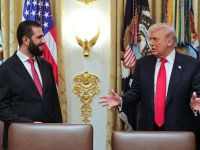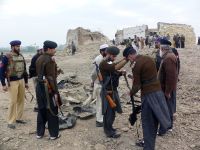Palestinian President Yasser Arafat was "happy" that an Arab summit threw strong support behind the Palestinian uprising against Israel but disappointed that no commitment was made to boycott the Jewish state, aides said Saturday.
The Palestinian leader had been looking for political and financial support from the summit called to address three weeks of clashes with Israel, a senior Palestinian official told AFP.
The summit gave political backing to the Intifada, or uprising, against Israel and decided to establish a billion dollars of funds for the victims of the clashes and to ease the Palestinians' economic dependence on Israel.
"Arafat is happy with the political support he got from the summit," said the official who asked not to be named, citing Arab backing for the Intifada and the Palestinians' demand for east Jerusalem as their capital.
"Generally the meeting was good. You can feel more Arab unity," he said.
Arafat, who was seen in his customary khaki battledores embracing other Arab leaders at points during the Cairo summit, had also held out hopes for a rupture of Arab diplomatic and economic ties with Israel.
But despite plenty of fiery rhetoric at the emergency meeting, the kings, presidents, emirs and their representatives backed down on an original intention to sever relations between some Arab countries and Israel.
The final summit communiqué stopped short of demanding an end to contacts, instead saying the leaders were committed to "firmly challenge Israeli attempts to infiltrate the Arab world in any form, and from now on to stop opening relations with Israel."
"The Arab leaders hold Israel responsible for any steps and decisions made by Arab states regarding relations with Israel, including their cancellation," said the statement, read by Arab League chief Esmat Abdel Meguid.
Arafat was "not happy" with those measures, the official said, adding that the Palestinian leader considered them "very weak and dark" and representing "no change in position."
"The Arabs are not ready to use economic weapons against Israel," the official complained.
Israel expressed satisfaction that countries like Egypt and Jordan decided not to abandon their peace with Israel.
But Prime Minister Ehud Barak also declared a time-out in the peace process after the summit, which backed the Palestinian uprising rather than urging its end as Barak had wanted.
Each side meanwhile continued to blame the other for the failure of a US-brokered truce agreed at their US-brokered summit in the Egyptian resort of Sharm el-Sheikh last week.
Arafat, speaking Saturday to Egyptian television from the corridors of the summit, said: "The Intifada will continue and it will win."
His information minister Yasser Abed Rabbo said later that Arafat meant that "peaceful demonstrations" would continue to express "rage" against Israeli occupation.
Arafat also angered Israelis with his opening speech to the summit in which he accused Israel of perpetrating a "massacre" against the Palestinians and warned that its behavior could provoke "wars of religion."
He was apparently referring to the visit by Israel's right-wing opposition leader Ariel Sharon to a site in Arab east Jerusalem that is holy to both Muslims and Jews, and at the heart of their competing claims to the city.
Arafat charged that Sharon's visit "was in concert with the government" of Barak and had prompted a "spontaneous and legitimate popular uprising" by the Palestinians.
Israel claims that Arafat, frustrated in the peace negotiations, had been looking for trouble for some time and used the Sharon visit as a pretext to launch the uprising -- (AFP)
© 2000 Al Bawaba (www.albawaba.com)







